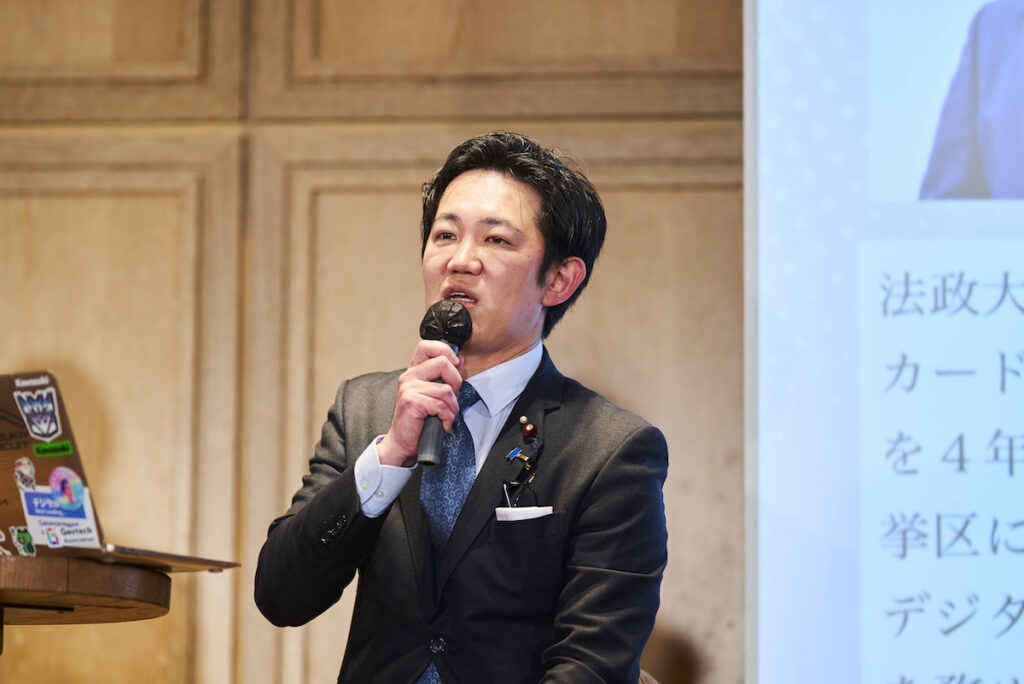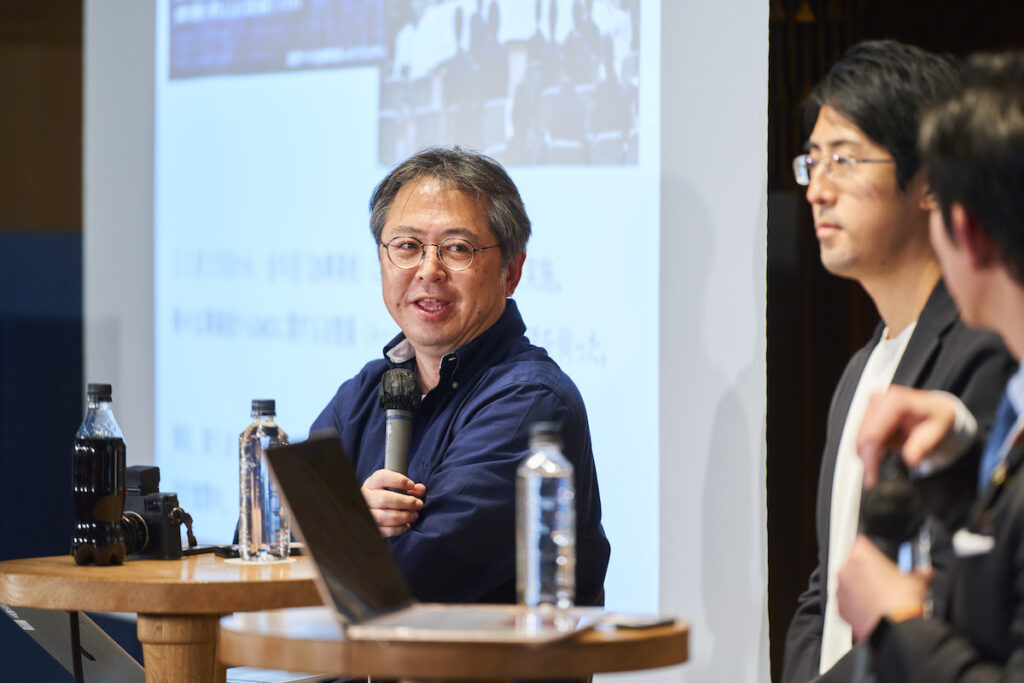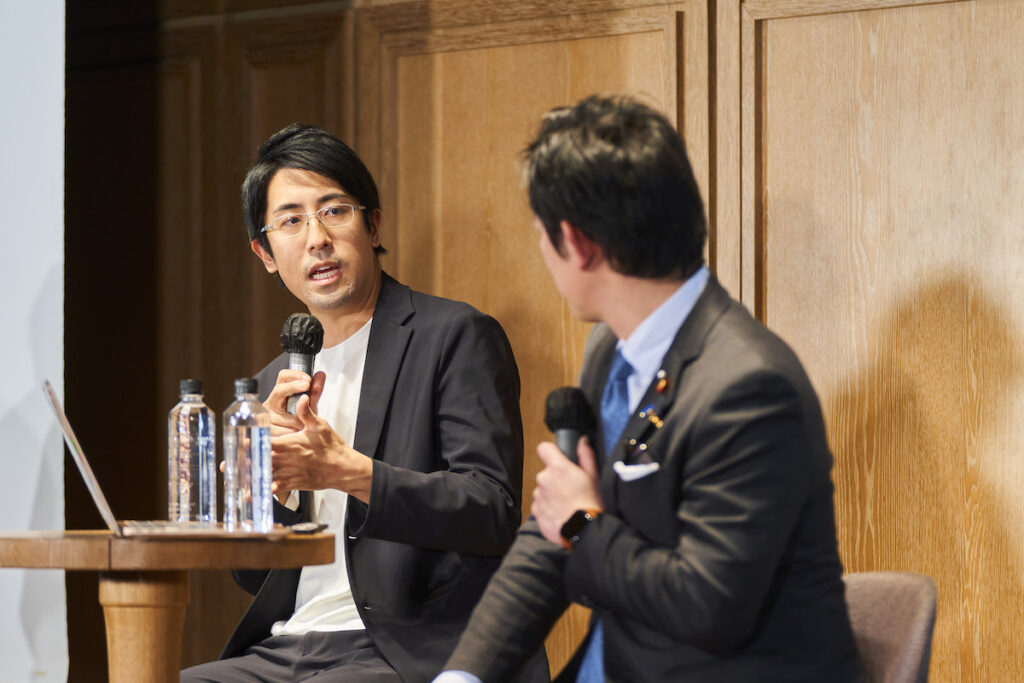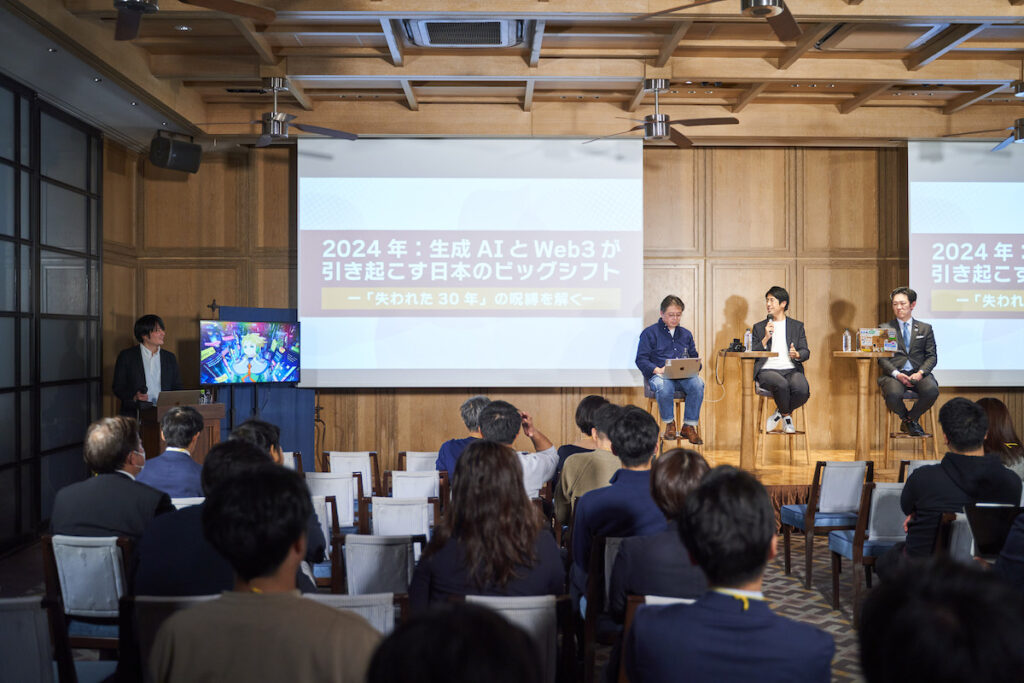
A limited paid community service centered on business leaders of major companies researching Web3.btokyo club‘ held a hybrid session on December 19th as a special session of ‘Year End Party 2023’ titled ‘2024: Japan’s big shift brought about by generative AI and Web3 – Breaking the spell of the ‘lost 30 years’.’
Mr. Kazuto Ataka (Professor, Faculty of Environment and Information Studies, Keio University), Mr. Hideto Kawasaki (Member of the House of Representatives and Director General of web3PT, Liberal Democratic Party Digital Society Promotion Headquarters), and Mr. Shuzo Narita (entrepreneur and angel investor) have collaborated with web3. Appropriate for the end of the year, we held an insightful and thought-provoking discussion on a broader theme than the usual “btokyo club”, such as how generative AI will affect Japan’s future.
The moderator for the session was Mr. Comugi, a researcher and co-founder of the Singapore-based web3 fund Emoote.
A big step in the corporate tax system and the DAO law

 Mr. Hideto Kawasaki
Mr. Hideto KawasakiFirst, the discussion centered on Mr. Kawasaki’s activities at web3PT under the theme, “What is the effectiveness of ‘digital currency x DAO = regional revitalization?'” The Liberal Democratic Party’s FY2024 Tax Reform Outline announced on December 14th included the exclusion of crypto assets held by third parties from being subject to end-of-year mark-to-market taxation. The outline was approved by the Cabinet on December 22nd. In 2023, issues issued by the company will no longer be eligible, and Rep. Kawasaki commented, “It took two years to finally get to this point.” Mr. Narita said, “This is a big step forward in that it will be possible to raise funds based on crypto assets and operate a company in Japan,” referring to the problem of promising web3 startups and others leaving Japan.
Regarding DAOs (decentralized autonomous organizations), Mr. Kawasaki said, “Activities are expanding across the country, including initiatives in Aogashima, Tokyo, the former Yamakoshi village in Niigata Prefecture, and DAOs that operate tomato farms.However, currently, DAOs have a corporate status. “They are not given the necessary security and have low social credibility.” In order to develop a system related to DAO, the Liberal Democratic Party web3PT held a “DAO rulemaking hackathon” from November to December. He said he plans to submit a proposal in early 2024 and prepare the DAO for legal status in April. For this purpose, we utilize a limited liability company scheme. The speedy move was made in response to feedback from business operators, who said, “If we wait for a new law to be created, we don’t know when it will happen.We want it to be implemented as quickly as possible.”
Potential of token economy

 Mr. Kazuto Ataka
Mr. Kazuto AtakaMr. Ataka, who is a member of the government’s various AI x data-related deliberations, introduced the story behind the establishment of the Liberal Democratic Party’s web3PT, and spoke about the movement of web3 in 2023, saying, “The generative AI shock will overshadow it. It’s gone,” he pointed out. However, there were many people who focused on new technology with the aim of making profits, and he said that there was a possibility that “distributed management could destroy new routes for realizing aspirations,” and that various initiatives were “decent.” I’m glad I became one,” he continued.
In addition, The Economist in the UK published an article titled “Why bitcoin is up by almost 150% this year” about the rise in crypto assets, especially Bitcoin, in 2023, calling crypto assets “like a cockroach and doing nothing.” The audience was excited when he introduced an article that compared it to “Even if you do, you won’t die.”
Mr. Ataka further summarized that the discussion on web3 is expected to have three roles: (1) a form of asset holding, (2) a token economy that replaces stocks, and (3) an identification device. Regarding point 2 in particular, he points out, “There has never been a system where you can start something with only a desire and make money out of it.” “DAO and the token system, which are forms that can give form to people’s contributions and thoughts, could become the second or third market in the future,” he continued, adding, “There is a possibility that they could replace the stock system to some extent.” He said he had already spoken to the group’s top management.
Mr. Narita went on to point out that the value of stocks has until now been enjoyed only by startups and business owners, and the disparity has widened. By decentralizing this, there is a possibility that a value that is completely different from the market value will be expressed.For example, if Shohei Otani’s huge contract of 100 billion yen is converted to a token value, it will be different from before. As a result, “it has the potential to have tremendous market value,” he said. If it were possible to express various values in various communities, it would become an extremely fair system and have the potential to “enrich society.” I think so,” he said.
Mr. Kawasaki explained that the unique feature of the token system is that it allows people’s good intentions to be visualized. If proof of volunteering or donations can be visualized with NFT, it will create value that replaces money. For example, politicians ask many volunteers to help them during elections, but legally they cannot receive compensation. With such regulations in place, he revealed his idea that it would be interesting if “Hideto Tokens” could be issued and handed out.
20 years after web3 and generation AI

 Mr. Shuzo Narita
Mr. Shuzo NaritaSince it has been about 20 years since the advent of the Internet, there was also discussion about what web3 would look like in 20 years. Ataka said, “We don’t know for sure yet,” but added, “Large Language Models (LLMs) enable computers and humans to communicate in natural language, and a world without them will no longer be possible. “We can’t go back,” but on the other hand, “web3 has not yet become something we can’t live without.” LLM is comparable to the emergence of smartphones, and is becoming an infrastructure like electricity and communications, but crypto assets and blockchain tend to develop in countries and regions with unstable economic systems and currencies, and in Japan He pointed out that in a stable country like Japan, “it is not yet necessary on a daily basis.” However, he said this also proves that “Japan is a stable and good country.”
Furthermore, Mr. Ataka gave an interesting analogy regarding the position of generative AI and web3. “If AI is all the rage in this venue, blockchain is about as exciting as this table, and DAO and tokens are about as much as the legs of the chairs,” he explained with a laugh.
Mr. Kawasaki also explained that there is a view that the rapid development of web3 can be roughly paralleled with the history of the development and spread of the Internet. He said that he now gets the impression that web3 has been gradually increasing since its inception. Regarding the future promotion of web3, the government emphasized that it will be important to establish a system to listen to the opinions of those actually involved in the project.
Mr. Narita said, “I no longer doubt the value of web3 and blockchain,” and said that the remaining issue will be a discussion about how much the application layer, or the layer below it, will grow. He said, “If you look at it from a long-term perspective, new services will definitely come out,” and went on to say that as an entrepreneur, it is important to take action when the environment is not favorable.
What Japan should address as generative AI advances


As generative AI expands and global competition intensifies, what are the most important issues that Japan should address? Mr. Ataka prefaced by saying, “I get asked that question almost every day,” and said that in addition to the big three, Open AI/Microsoft, Google/DeepMind, and Meta, Elon Musk has also entered the LLM. He pointed out that this is now a “de facto battle, like Godzilla vs. King Ghidorah, and only a few major Chinese companies can enter the market.” After that, “It’s better to look at their movements and think about what to do on that basis.” There is also discussion about developing domestically produced LLMs, but it is not about winning this battle head on, but rather using a considerable level of technology. He expressed the view that it is understandable if the purpose is to have one.
Referring to Japan’s postwar recovery and economic growth, Mr. Ataka explained, “Japan fought a war for oil, and was defeated.However, after the war, Japan achieved growth without having a single major oil company.” In other words, just as Japan has achieved significant economic growth even without possessing oil, the question of whether or not to have an LLM is a different perspective from future growth and development. “Can we implement this?” he emphasized.
Specifically, he pointed out that the major challenges for humanity over the next half century to a century are “coexistence with the earth” and “how to survive the population adjustment phase.” He stated that not only is there an urgent need to counter global warming and environmental measures, but also to strengthen resilience to minimize the damage caused by it, and that most countries, including China and India, will be entering a phase of population adjustment. He said that we should focus on producing answers that contribute in some way to the three major problems.
The one-hour session was filled with excitement due to the unique perspectives of the three speakers, and the session had already passed its end time. As the moderator, Mr. Comugi, was about to conclude, Mr. Ataka said, “I just remembered” one of the important reasons why he appealed to Liberal Democratic Party member Masaaki Taira (web3PT chairman) for the establishment of web3PT. .
He stated that the current social and economic system is premised on continuing to increase wealth, but at the same time it is trying to do something that is logically extremely difficult to reduce the environmental impact. “Of all the wealth creation systems we’ve come across, it’s likely to have the lowest environmental impact.” Furthermore, he pointed out that when working to reduce environmental impact from a commons perspective, the “incentive system” of the DAO and token system will be important, rather than the current “punishment system.” He concluded the discussion by saying that he remembered during the hour-long talk that he had told Taira that such a move was “in the right direction,” and the audience was excited.
|Text/Editing: CoinDesk JAPAN Editorial Department
|Photo: Keisuke Tada
The post Token economy will surpass stocks──[Year End Party2023 Special Session Event Report] appeared first on Our Bitcoin News.

 1 year ago
88
1 year ago
88














 English (US) ·
English (US) ·